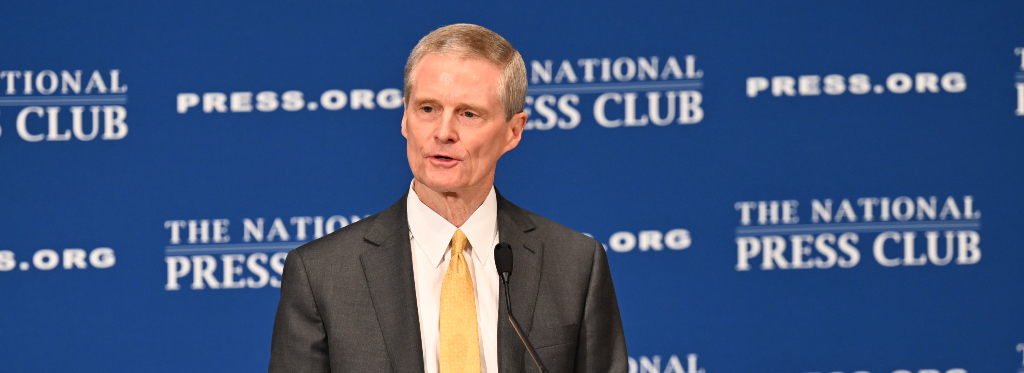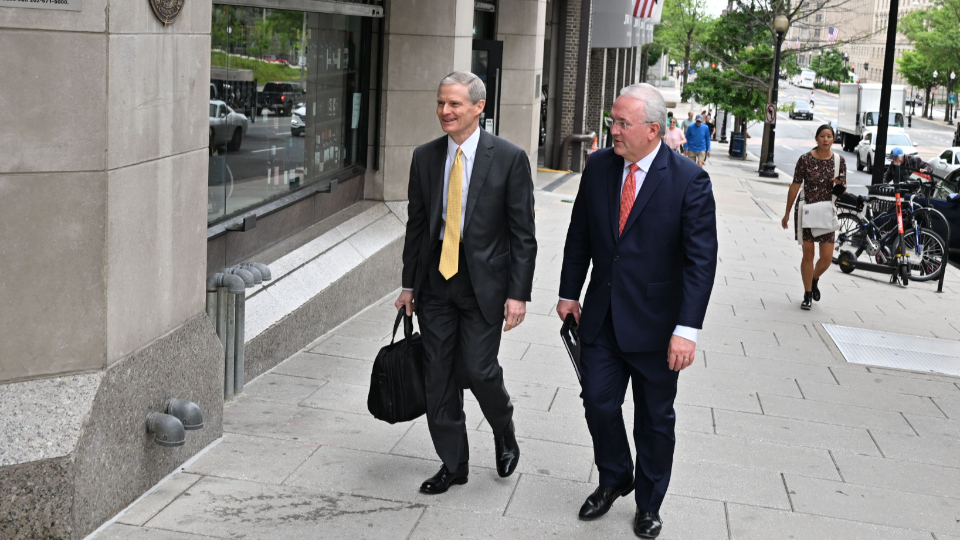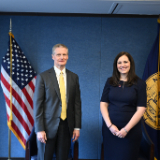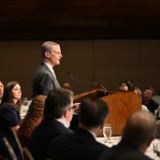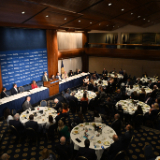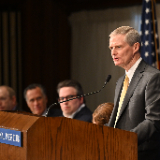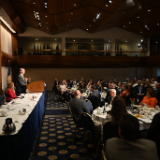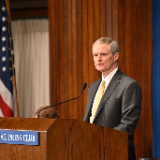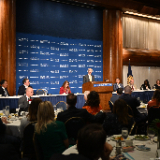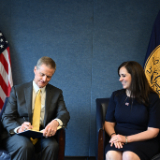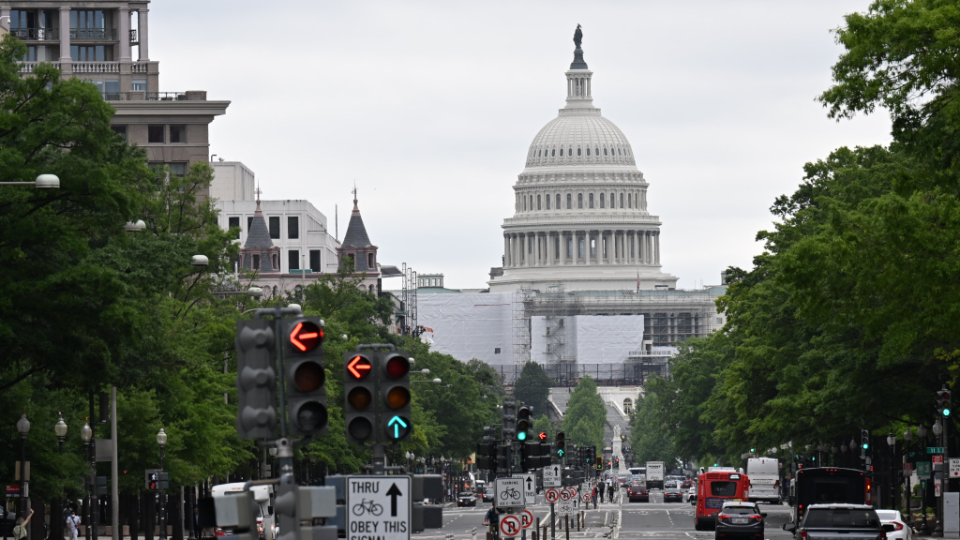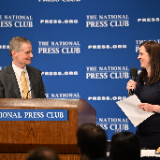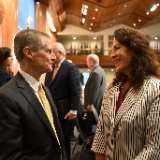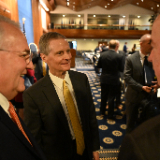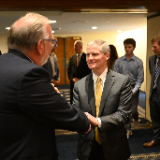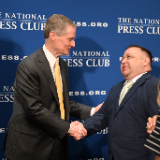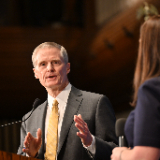At the beginning of his speech before nearly 100 journalists at the National Press Club in Washington, D.C., on Thursday, May 26, 2022, Elder David A. Bednar of the Quorum of the Twelve Apostles briefly addressed the school shooting in Uvalde, Texas.
“We mourn with those who mourn and pray for all those impacted by this senseless act of violence,” Elder Bednar said. “My prayer and my blessing is that we will be guided, comforted and helped in our important work, and that victims, families and nations might be granted the peace that surpasses all understanding — the peace that comes from Jesus Christ.”
The balance of the Apostle’s remarks provided an overview of the mission and work of The Church of Jesus Christ of Latter-day Saints. (Read the full remarks.)
Downloadable video for journalists: SOTs | B-roll
| Temple Square is always beautiful in the springtime. Gardeners work to prepare the ground for General Conference. 2012 Intellectual Reserve, Inc. All rights reserved. | 1 / 12 |
Elder Bednar — the first to address this group since Church President Gordon B. Hinckley (see C-SPAN video below) did so in 2000 — detailed the what and the why of the Church of Jesus Christ’s global humanitarian, welfare, educational, temple, missionary and genealogical initiatives.
“The basic purpose of The Church of Jesus Christ of Latter-day Saints is to help people learn about the nature and attributes of God, to love God, to become disciples of His Son Jesus Christ, and to love and serve our brothers and sisters,” Elder Bednar said. “We believe God can change our hearts and make more of us from the inside out than we can ever make of ourselves. And we also believe that change many times is required from the outside in.”
Video: President Hinckley speaks at the National Press Club in March 2000
Humanitarian Aid and Welfare
The Church’s humanitarian work is a significant part of that “outside in” change. Elder Bednar shared details from the recent 2021 Annual Report of the faith’s humanitarian support (which included $906 million in expenditures and 6.8 million hours of service). He also mentioned that the Church is helping those displaced by the conflict in Ukraine and those in 27 neighboring European countries. Much of this outreach is done in collaboration with other global organizations.
“We certainly do not have all of the answers,” Elder Bednar said, “but we do lock arms with the global community to eradicate hunger, administer lifesaving immunizations, provide wheelchair mobility for those who are immobile, and train health care professionals to provide physical, mental and emotional support.”
| Temple Square is always beautiful in the springtime. Gardeners work to prepare the ground for General Conference. 2012 Intellectual Reserve, Inc. All rights reserved. | 1 / 8 |
Education
The Apostle also spoke of the Church’s spiritual and secular education initiatives. These are core to how the Church helps people help themselves. In 2021 alone, Elder Bednar said, the Church put more than $1 billion toward education. This includes funding for four universities and college campuses, 645 institutes of religion and a global seminary program for teenagers.
“We have learned that a person with a new heart, a person changed from the inside out, serves and blesses family, friends, neighbors, congregations, and communities in powerful ways,” Elder Bednar said. “They learn to see each other for who they are and therefore treat each other accordingly.”
Race Relations
On the topic of race relations, the senior leader noted the collaboration in recent years between the Church and the National Association for the Advancement of Colored People.
“We are working together to support community projects in major U.S. cities, provide academic scholarships for underserved populations, and initiate this summer the first-ever Amos C. Brown Fellowship to support approximately 50 young people for travel to and work in Ghana to gain greater insight into racial harmony,” Elder Bednar said.
The LGBTQ Community
Elder Bednar also mentioned the Church’s bridge-building effort with the LGBTQ community in the United States. This includes support for religious freedom and non-discrimination bills in Arizona and Utah, as well as a federal bill currently under consideration.
“We are proud to stand with our LGBTQ brothers and sisters — some of whom are with us today — in this important effort,” he said. “It is hard work — and an objective worth fighting for. While we may not agree on everything, we surely are building a foundation of mutual respect and understanding.”
The Washington D.C. Temple
Elder Bednar invited journalists to tour the renovated Washington D.C. Temple (the open house ends on June 11) to better understand the heart and mind of a Latter-day Saint.
The ceremonies within the house of the Lord “lift, inspire, ennoble, and change participants as they accept the individual responsibility to follow the teachings and example of Jesus Christ,” Elder Bednar said. “Much like the children of Israel with their tabernacle and King Solomon’s temple, we are a temple-building and a temple-loving people. And the spiritual promises we make in our temples today are fundamental to changing people.”
Elder Bednar touched on a variety of other topics. He said women make up a majority of the Church and participate in many ways. Some 93,000 of them lead local congregation Relief Societies (the faith’s organization for women). He said the Church’s combined 91,000 missionaries learn the “life-changing lesson that he or she is part of something greater and more important than self.” He said the Church’s annual (and free) RootsTech genealogy conference — which served more than 3.1 million people this year — helped participants “discover their ancestors, share their memories and make meaningful connections.”
Why do Latter-day Saints do these things?
“We are the Church of Jesus Christ, reestablished or restored upon the earth in the latter days in preparation for the Second Coming of the Lord Jesus Christ,” Elder Bednar said. “We do all of these things because as His disciples we love Him and want to follow His example in our lives.”
Q&A
After his speech, Elder Bednar answered more than a dozen questions. Several of these questions (edited for concision and clarity) and his responses are below.
Why is the Church growing so much in Africa?
“Africa has been influenced in many parts of the continent through early Christian missionaries. When you go to visit with a congregation there and you recite a verse from the Bible, everyone in the congregation, without looking at a text, can recite it with you. There’s a very strong Christian tradition. So, the message of the restoration of the primitive Church strikes a resonant chord with these people. They come, they see our congregations, they participate, and they desire to join.”
Many Church leaders, including you, have deep business administration backgrounds. What are some of the advantages of so much business acumen at the Church’s highest levels?
“I have tried really hard not to let my academic training influence what I do as an Apostle of the Lord Jesus Christ. In the Book of Mormon, there’s a verse that says ‘when they are learned they think they are wise and hearken not unto the counsel of God.’ So I do not take my academic background and experience and impose that on the Church. I let the doctrine of Christ influence how I see things So, certainly there are practical advantages in knowing about how organizations run and budgeting and so forth. But I view that really as secondary. I try to view what we do and the mission we fulfill through the lens of the gospel of Jesus Christ.”
With over $100 billion in funds and assets, the Church has more capability than any other church in the country to help eliminate poverty. What more could the Church do in terms of humanitarian efforts?
“People want to bang on the Church and say, ‘Well, you’ve got all that money in reserve.’ Yeah, and it’s a good idea for other people to follow that example. You can read in the Old Testament about seven years of famine and seven years of plenty. It’s a good idea to prepare. These undertakings that I’ve described are resource consuming, not resource generating. And a lot of people depend on the resource that we provide. And if things are different in the future than they are now, we think it’s provident and wise to prepare to maintain that kind of support in an uncertain economic environment.”
Can you envision a day when LGBTQ Church members can marry and be sealed within the Church?
“We believe that marriage between a man and a woman is ordained of God, and that the family is central to the Father’s plan for the eternal destiny and happiness of his children.”
You mentioned that women lead within the Church in many ways. Will there ever be a female president of the Church?
“We follow the pattern of the ancient church. We believe that a man must be called of God by prophecy and by the laying on of hands by those who are in authority to preach the gospel and administering the ordinances thereof. The pattern anciently was that the apostles were men.”
How would a transgender person be treated if they had already completed their transition before exploring membership in the Church?
“We welcome all and strive to love them. Now, I use the word strive because we don’t do that perfectly. And so people have stereotypes, they have misconceptions, they have biases and they have prejudices. We strive to love everybody.”
Given the significant financial strain that tithing is for those in war or in abject poverty, is there any discussion within the Church about not requiring that for people in those situations or at least tithing only what is left after paying for housing, food and other necessities?
“President Hinckley stood at this pulpit in 2000 and made reference to the law of tithing. I remember watching him teach in impoverished areas of the country and promising the people: the pathway out of poverty is keeping the commandments of God, including tithing. The Church doesn’t need their money, but those people need the blessings that come from obeying God’s commandments.”
Where do you see reporters misreporting?
“You always lose something in the generality of a stereotype. ‘Latter-day Saints are like this or they all do this.’ I think there needs to be a little more precision. There needs to be a little more listening and asking. We wouldn’t ever ask for the right to be able to review it. But I think they could do a little more than just take somebody else’s secondhand view and push it along. There’s a little homework that ought to be done to find out what’s really taking place.”
Can you talk about the decision to really emphasize the full name of the Church as opposed to calling yourself Mormon or LDS Church?
“I think that President Russell M. Nelson will be known forever as a man of remarkable courage to say we will no longer use a nickname, pejoratively attached to our Church by our enemies, anymore. And we’re inviting other people to call us what we are called: The Church of Jesus Christ of Latter-day Saints. You know, we live in a world where everybody is offended about almost everything. And we don’t take offense. We just ask people to respect what to us is very sacred. The name of the church was revealed. We didn’t have a task force and test it with focus groups. It was revealed by the head of the Church, who is Jesus Christ. And we simply are asking people to respect that and call us what we are.”
